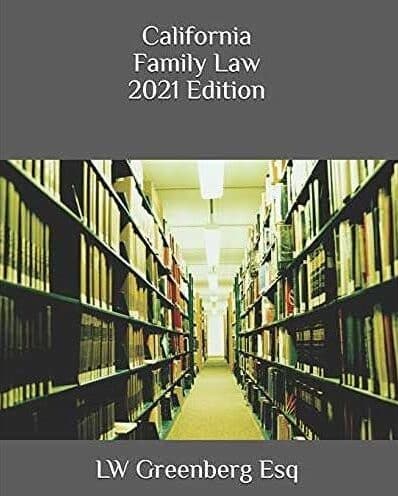Divorce Questions
California Family Law 2021 Edition
“I’m so glad I purchased this book. It totally gave me the upper hand in my pending divorce case. The case law provided in this book helped me to successfully terminate spousal support. If you’re involved in a family law matter in California, you need this book. Trust me.” Earnest L. Cooper Jr. A verified amazon.com purchaser
The Questions and Answers
Divorce Question 1: How do you start a divorce in California?
Answer: You complete a Petition (FL-100) and file it with the court. The filing fee is $435. If you cannot afford the filing fee you can also file a completed Request to Waive Court Fees (FW-001). (See Chapter 15 of California Family Law 2021 Edition by LW Greenberg Esq.)
Divorce Question 2: Does my wife have to agree to the divorce?
Answer: No. No consent is necessary to get a divorce. The requirements are: (1) you must be a resident of the State of California for 6 months and (2) a resident of the County for 3 months prior to the filing of the Petition for divorce AND (3) you must give your wife notice of the divorce. Serving a copy of the divorce paperwork provides this necessary notice. (See Chapter 4 of California Family Law 2021 Edition by LW Greenberg Esq.)
Divorce Question 3: On the Petition form (FL-100) it has the word “dissolution”. Is that the same as a divorce?
Answer: Yes. “Divorce” and “dissolution” mean the same thing. In California a divorce is called a dissolution. (See Chapter 4 of California Family Law 2021 Edition by LW Greenberg Esq.).
Divorce Question 4: Will I have to go to court to get a divorce?
Answer: That depends on whether you and your soon-to-be ex-spouse can agree on divorce issues. You only have to go to court if you and you spouse cannot agree on every single divorce issue (like alimony or custody). If you disagree on even one issue, then a judge will have to decide that issue. Having a judge decide requires a court appearance. (See Chapter 4 of California Family Law 2021 Edition by LW Greenberg Esq.)
Divorce Question 5: If I get divorced, will I have to pay my wife alimony because I make twice as much money as she does?
Answer: Probably yes. Although there are several factors that a judge must take into consideration before ordering one spouse to pay alimony to the other spouse, chances are you will pay alimony to your soon-to-be ex-wife for some time. (See California Family Law 2021 Edition by LW Greenberg Esq. Chapter 14 for more information on this topic.) (For more information about alimony, click here.)
Divorce Question 6: I have lived with my boyfriend for 15 years. Do we have a common law marriage?
Answer: No. No matter how long you live with your boyfriend in California, you are not married until you get married. While there are a few states that recognize common law marriage, California abolished common law marriage in 1895. (See California Family Law 2021 Edition by LW Greenberg Esq. Chapter 3 for more information on this topic.)
Divorce Question 7: If I get a divorce, will I have to share the money that I put into a retirement account that is my name only?
Answer: Most likely, yes. If the money that you put into your retirement account came from money that you earned while you were married, it is community property. Community property belongs to both spouses. Accordingly, you will have to share that money with your soon-to-be ex-spouse. (See California Family Law 2021 Edition by LW Greenberg Esq. Chapter 26 for more information on this topic.)
Divorce Question 8: I own a house that I purchased and paid off prior to getting married. Will my spouse get half of my house if we divorce?
Answer: No, if you do not use any of the money that you earn while you are married to buy anything for this house, and you do not add your spouse’s name to the title, the house will remain completely yours, even if you divorce. (See California Family Law 2021 Edition by LW Greenberg Esq. Chapter 25 for more information on this topic.)
Divorce Question 9: I have six million dollars in investments. Should I have my soon-to-be-spouse sign a prenup if I expect to keep 100% of my investments after a divorce?
Answer: Yes. You should both sign a pre-nup (called a pre-marital agreement in California). However, your investments may remain only yours if: (1) you keep your investments in separate accounts, (2) you do not add your wife’s name to any of your investment accounts, (3) you do not put money that you earn while married into these accounts) AND (4) you do not work on these accounts as your job during the marriage. In that case, your six million dollars (plus any interest) will likely remain your separate property. (See California Family Law 2021 Edition by LW Greenberg Esq. Chapter 25 for more information on this topic.)
Divorce Question 10: My soon-to-be ex-husband told me that he does not want anything to do with our teen-aged daughter after the divorce. Can I get a court-order that says that he must visit with her?
Answer: Unfortunately, no. The law cannot make a parent do what a parent should do. (See California Family Law 2021 Edition Chapter 11 by LW Greenberg Esq. for more information on this topic.)
Divorce Question 11: I just found out that my wife is sleeping with our unmarried neighbor. I am very angry, and I want to divorce her. Can I get a divorce because she is a tramp?
Answer: No because California is a no fault divorce state. This means that granting a divorce requires only that a marriage cannot be repaired. Who did what to whom does not count. The reasons for the failure are not admissible in a court of law. If you feel that your marriage cannot be saved, you may request that a court grant you a divorce. No requirement to get your spouse’s consent. And your spouse does not have to agree with you or sign anything. (See California Family Law 2021 Edition by LW Greenberg Esq. Chapter 4 for more information on this topic.)
LEGAL DISCLAIMER
The resource used for the answers to the divorce questions above is California Family Law 2021 Edition. The questions and answers are not provided as legal advice. If you are seeking legal advice for a divorce in California, please contact a California-licensed attorney who practices in the family law field.
Contact Us
If you have a question that you would like to see answered here, click here and fill out the form.
Copyright Protected
The US Copyright laws extend to all material, information pictures, etc. on this website. © LW Greenberg Esq. 2024. To go to the policy page, please click here.


